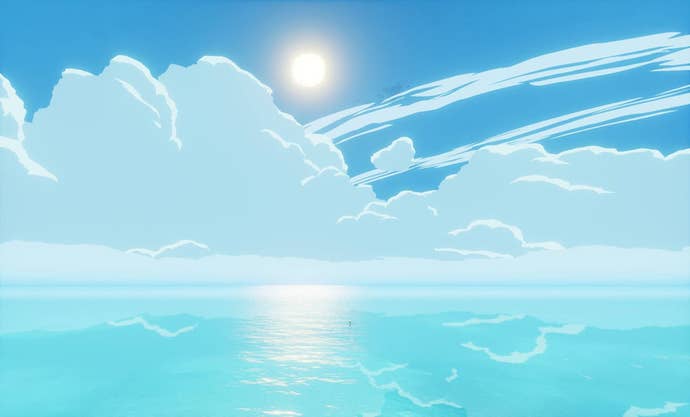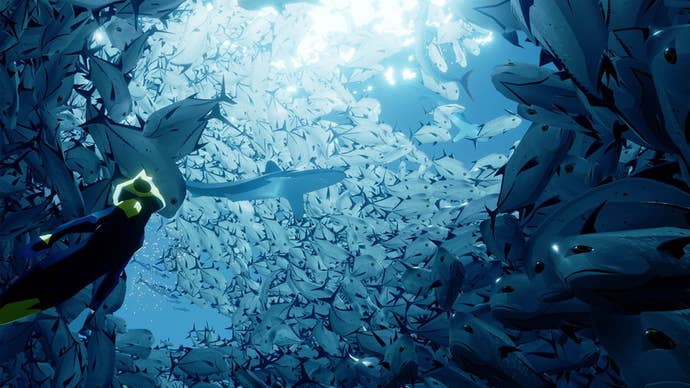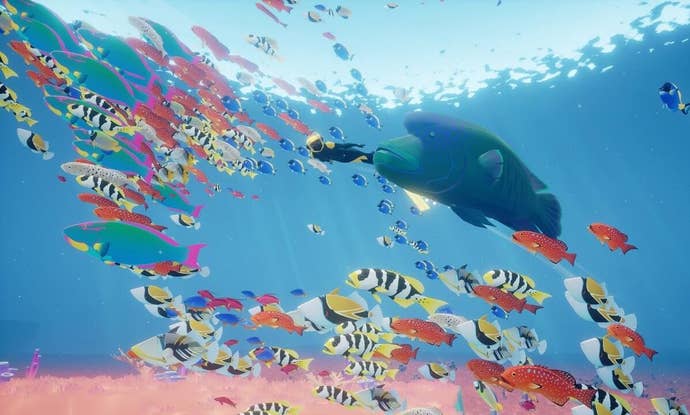Abzû PlayStation 4 Review: (Dis)enchantment Under The Sea
Giant Squid's stunning, serene underwater adventure trips over itself, despite rarely setting foot on land.
This article first appeared on USgamer, a partner publication of VG247. Some content, such as this article, has been migrated to VG247 for posterity after USgamer's closure - but it has not been edited or further vetted by the VG247 team.
Vocabulary has become a highly visible, and highly divisive, topic of late. Blame the presidential race: After eight years of an eloquent, intelligent Commander-in-Chief, a significant percentage of the country hopes to replace him with a man who uses the vocabulary of a fifth-grader.
But make no mistake! Donald Trump's seemingly rudimentary use of English is a cunningly calculated tactic, and it plays a huge part in his popularity. It's been central to his strategy of presenting himself as a straight-talking everyman despite, you know, being essentially the furthest thing from an Average Joe. Writers bristled at his claim that "I have the best words," but he wasn't wrong — he may not use the smartest or most sophisticated words, but he uses words in a way that resonates powerfully with his supporters.

Just as words have meaning, so too does a person's approach to words. As a writer, I employ a different vocabulary set, and a different and tone of language, for a professional piece of media criticism like this than I would for a casual, off-the-cuff blog post, or for a piece of technical writing. Part of the joy of language comes from learning how and when to make use of its different tools, and understanding the subtle messages that emerge not only from your words but from their overall gestalt is essential to effective communication.
I realize that high-minded thoughts about vocabulary may seem an odd lead-in to a review of Giant Squid's Abzû, a game in which the only words beyond the control tutorial you experience during first minute of the adventure come entirely in two forms: Labels detailing the names of the various fish you encounter under the sea, and command prompts to meditate and astrally project yourself into the perspectives of those fish. Nevertheless, vocabulary sits at the heart of Abzû — or, more specifically, at the heart of Abzû's central identity crisis.
Abzû will remind you a great deal of many other indie games of recent years. It shares a direct lineage with Journey, but it brings out bags of tricks you've seen in the likes of Fez as well. What narrative exists here is told not only through wordless pantomime as your nameless deep-sea diver encounters and interacts with life both natural and artificial along their journey, but also through mysterious hieroglyphs and symbols etched on the walls of crumbling ruins you traverse as you swim forth. The game never fully explains the nature of your character or the ominous triangular mechanisms that appear throughout your quest, leaving much to the player's imagination, but it shares enough in common with standard sci-fi tropes that you can make an educated guess at what it's all about from early on. More intriguing is the main character's relationship to the sea life throughout the game, and specifically one particular creature that initially appears to be an adversary but whose role turns out to be much greater, and far more nuanced, than that.

With its wordless design, immersive visuals, and powerful score, Abzû turns out to be yet another game that attempts to present itself with the vocabulary of film. It does so in a very different fashion than, say, something like The Last of Us. Rather than attempt to drop players in the thick of a Hollywood summer blockbuster, Abzû goes more for a science fiction mind trip angle. Initially, the precedent that came to mind as I played was Stanley Kubrick's 2001, what with all the majestic underwater visuals, protracted scenes of silent, passive observation, and enigmatic ancient machines. After a while, though, I realized Abzû has more in common with the troubled 2001 imitator Star Trek: The Motion Picture. Both work as a surface reading of better creations, and both ultimately succumb to the rigors of formula.
Bear in mind, I'm part of the minority that actually likes the first Star Trek movie. I suspect your own take on Abzû will depend heavily on your own take on that film. It's full of long, slow, drawn-out sequences in which the audience is meant to soak up visual splendor and be impressed by the scale of things... and make no mistake, much of Abzû turns players into a passive audience, being flung down underwater tunnels by a rushing current or clinging to meandering sea life. Those scenes prove to be quite enjoyable, but you do ultimately spend them as an inactive spectator.
I suppose my frustration with them has to do with how they fit into the greater scheme of the game. Abzû uses them as transitions between scenes, momentary distractions to liven up an otherwise slow-paced adventure. Yet the rest of the journey honestly never quite feels as slow-paced as it probably should. Abzû presents itself as an immersive, underwater odyssey, but it's a much more guided experience than that. From the beginning, the vast expanses of ocean beyond your current sight exist only as the aquatic equivalent of a skybox — if you try to venture beyond your current play space, the game will simply nudge you back with invisible walls. And while you can certainly take your time playing to soak up the gorgeous subaquatic world Giant Squid has created, don't expect an open sandbox experience akin to Aquanaut's Holiday or Endless Ocean. You move sequentially from one underwater grotto or ruin to the next, and each space contains only a handful of things to do: Liberate a couple of fish species, find a collectible, or solve a simple puzzle.
This is all perfectly fine, but the game never breaks beyond initial impressions. It constantly seems on the verge of opening into something truly grand, but that explosive moment never comes. On the contrary, the game seems to shrink as you play, growing perpetually smaller as its formula and structure begin to exert themselves over its grand ocean world.
And this, I think, speaks to the essence of my biggest frustration with Abzû: It uses so much film vocabulary to present itself, but ultimately the vocabulary of video games exerts itself to the game's detriment. This entire world is much less mysterious and organic than it initially seems. After a while, it falls into video game patterns and clichés, requiring repeated actions and behaviors, whisking players from one carefully manicured structure where the only things they can do are admire the scenery and complete the tasks necessary to advance to the next area. There's a collectible item — ammonite shells — that appear throughout the game, which you can gather to... well, I'm not sure what the point is beyond earning a trophy, actually. I missed one or two of the shells, and the only indicator of which ones you've failed to collect appear diegetically in a handful of areas you encounter throughout the first half of the game and which require a fair amount of post-game backtracking to find. They're the most conspicuously video game-like element of a video game that's at its best when it's distancing itself from the rigors and clichés of video games.

Overall, Abzû doesn't come together as elegantly as I'd hoped when I first explored its opening areas last year at E3. No question, it's breathtaking in its beauty; and the second Austin Wintory's stunning soundtrack goes up for sale in on vinyl, I'll put my money down for a copy. But ultimately, the game can't decide what language it wants to speak: Does it want to express itself as a breezy cinematic experience, or would it prefer to just dig in an be a video game, doing all the things a video game does? It never fully commits to either set of vocabulary, and in the end it doesn't present an inventive hybrid but rather a frustratingly incomplete experience. As someone who genuinely appreciates brevity in games, I don't say this often... but I feel like Abzû's length works against it. With a little more time, its disparate elements might have had an opportunity to come together and find harmony. Alas, the game's fundamental personality crisis results in a work that isn't nearly as serene as the gorgeous underwater vistas it presents.
InterfaceSimple and direct. The total freedom of movement in all three dimensions can be disorienting, but it's also liberating.
Lasting AppealVery slim. You can easily finish the game in three or four hours, and there's little reason to return once the credits roll.
SoundWorth it for the music alone. One of the most majestic game soundtracks ever.
VisualsEvery bit as stunning as the music. The visual design is by far the most exciting and varied element of the adventure.
ConclusionDoes beauty alone justify a game? Can the novelty of swimming through majestic oceans teeming with life overcome an otherwise fairly by-the-numbers experience that never quite achieves the creative heights it so earnestly aspires to? I suppose that's down to the player, but as much as I wanted to love Abzû, the end result fell just short of brilliance. It's worth playing for the incredible presentation, but don't expect something profoundly new here.
